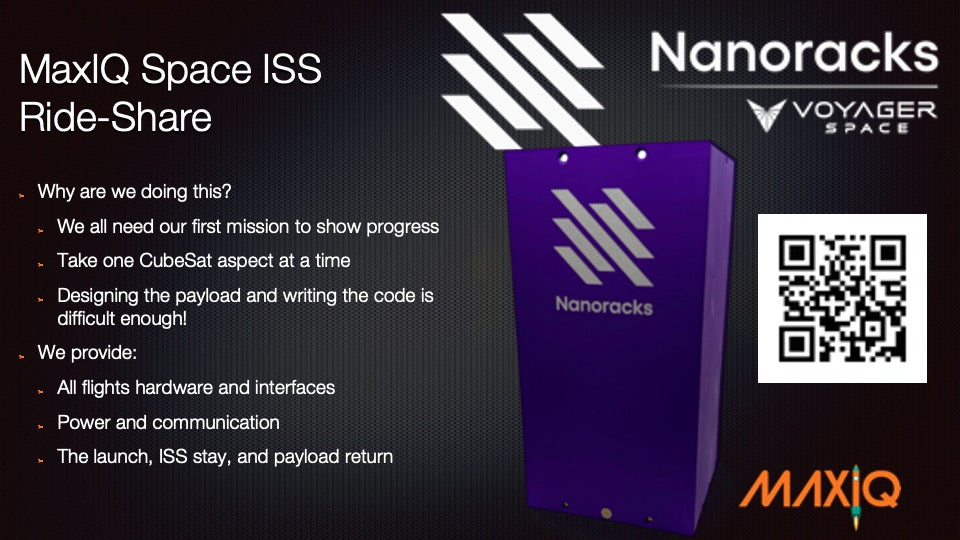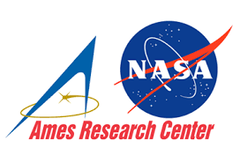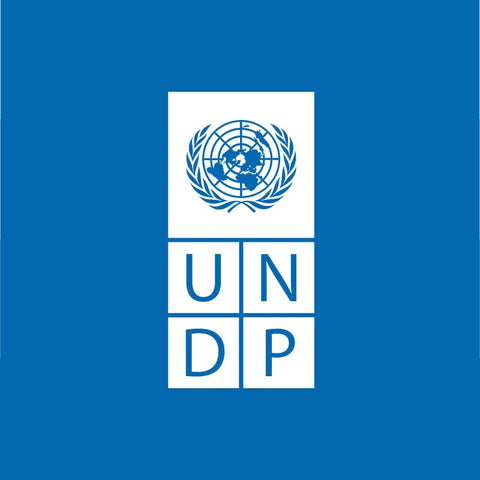International Space Station Rideshare
International Space Station Rideshare
Couldn't load pickup availability
Partnering with Princeton University, Voyager, and NASA, MaxIQ Space annually launches and hosts twenty student xChip payloads on the ISS for 4 to 6 weeks. A downlink of data will be available, and the payloads will be returned on completion of the mission.
This opportunity is being made available by Voyager through its Space Act Agreement with NASA's U.S. National Lab.
The project begins early in the academic year (northern hemisphere/ July August), with the launch to the ISS in June/July the following year. All payloads should be finalised by end April to be shipped to MaxIQ Space in May.
This project includes:
Space STEM program - MaxIQ Space delivers a full Space STEM program in middle/ high schools, and more information may be found on this page.
NASA HAB - Prior to launch to the ISS, all payloads are tested on the NASA High Altitude Balloon mission, all details can be found here.
Kits - We encourage groups to collaborate in the design of the payload, therefore, we will ship the Space STEM kits to accommodate up to three classes or clubs. Two flight hardware kits (MK04) will be shipped to you and your team, one that you will configure and code for the ISS mission itself (space-grade), and a second, identical (yet not space-grade) kit that will stay with you for parallel data collection.
Course - you and your team will be enrolled in a Canvas course, developed specifically for this project. The course includes curriculum, suggestions, experiments to perform to understand your kit and its applications, a discussion forum, and a calendar to manage dates, deadlines and events.
Virtual Workshops - we will schedule and deliver four, sixty minute Zoom workshops. These sessions will cover the requirements of the project, and will give you and your team access to our technical team. One of the workshops will be held once the payloads have returned from the ISS, so that we can compare notes and data sets, and prepare for presentations at space industry conferences.
Launch - the launch date and location will be shared with you a few months into the program, we will have at least three months notice. The payloads will travel to the International Space Station on one of the resupply or crew missions. The payloads are returned with a crew mission, and your kit will be returned to you.
Logistics - When you receive your kits, we will include a container for you to use when shipping the space-grade kit to us for integration. In addition, all shipping costs will be covered by us, all you'll need to do is attach the shipping label to the package in preparation for collection by the courier.
Pre-requisites:
There are no prerequisites to signing up for this project. We've included the Space STEM program so that everyone is ready to participate fully when the ISS launch arrives.
Limited Space:
This mission can accommodate sixteen payloads, therefore we are limited to sixteen groups participating.
Signing up:
The full cost of participation is US$ 14,990.00, paid as milestones arrive:
i) 40% to secure participation (by latest end September)
This amount covers all the hardware, the Space STEM program, and the NASA HAB launch mission.
ii) 50% when the ISS payload is ready to be shipped for launch (March).
iii) 10% when the payload is returned from the ISS.
If your group already has MaxIQ kits or has completed the Space STEM program, and/or the NASA HAB mission, please let us know as this will reduce the full cost of this ISS project (info@maxiq.space).
Discounts and Sponsorships:
MaxIQ Space will discount participation to existing customers, and has made arrangements with NASA Space Grant Consortia and other space agencies for sponsorships. Contact Judi at MaxIQ.Space for more information.
Opportunities in the Classroom
This ISS ride-share mission offers a unique opportunity to support various subjects through hands-on experimentation and data analysis in the microgravity environment.
Physics: Students can study the effects of microgravity on various physical phenomena, such as acceleration, g-force, and pressure. They can conduct experiments to explore the behavior of objects in microgravity and analyze data to understand the underlying principles of Newtonian physics.
Biology: The microgravity environment provides a fascinating opportunity to study biological processes and their adaptations. Students can design experiments to investigate the effects of microgravity on plant growth, cellular behavior, or the development of microorganisms. They can analyze data on temperature, humidity, and gas concentrations to understand how these factors impact biological systems in space.
Chemistry: Students can explore the behavior of chemical reactions and materials in microgravity, leveraging data on temperature, pressure, and volatile gas concentrations. They can investigate phenomena such as fluid behavior, crystal growth, or combustion processes, gaining insights into fundamental chemical principles and their applications in space.
Engineering: The mission offers students a chance to apply engineering principles to design and configure payloads for spaceflight. They can explore concepts related to power consumption, thermal management, and structural integrity, optimizing their payloads for operation in the harsh environment of space. Students can also analyze data to evaluate the performance of their designs and propose improvements for future missions.
Environmental Science: Students can study the environmental conditions aboard the ISS and their impact on living organisms and equipment. They can analyze data on temperature, humidity, and gas concentrations to assess the microclimate within the spacecraft and explore strategies for maintaining a habitable environment for astronauts.
This interdisciplinary approach integrates concepts from physics, biology, and engineering to address real-world challenges in space exploration.
Share
How to use
How to use
We have developed "Getting Started Guides" for all our kits, please find the appropriate guide at these links:
STEM Starter Kit (MK01/SDG)
TinyGS Ground Station Kit (MK05)
Frequently asked questions:
Visit the FAQ page for updated answers.
Shipping & Processing
Shipping & Processing
Please allow 3-5 days for processing.
Shipping is available globally.
Price and shipping times are subject to individual orders.


Our Partners
Changing the world isn't easy, and we couldn't do it alone.
A core value of MaxIQ is to be able to provide our educational resources to students around the globe, especially those who live in areas where there is a lack of educational infrastructure to support these young minds in achieving their full potential. MaxIQ wouldn't be able to fulfil our mission without support from...
Subscribe to our emails
Subscribe to our mailing list for insider news, product launches, and more.






